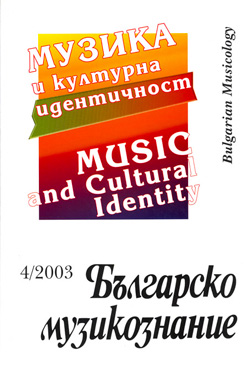Многогласно пеене и културна идентичност през Българското възраждане
Polyphonic Chanting and Cultural Identity during the Bulgarian National Revival
Author(s): Stefan HarkovSubject(s): Music
Published by: Институт за изследване на изкуствата, Българска академия на науките
Summary/Abstract: During the period of Bulgarian National Revival (XVIII-XIX c.) the issue of our cultural identity became particularly topical. Still in the early XIX c. Bulgarian chant repertory was created in the Rila Monastery, which strengthened the medieval identification of Bulgarians as part of the Byzantine-Slav spiritual community. However, after the middle of the XIX c. considerable changes occurred in the Bulgarian society. The contacts with Central and Western Europe joined the Bulgarians to the achievements of modem European bourgeois civilization. The aspiration to create an independent Bulgarian Orthodox Church, free from the rule of the Istanbul Patriarchate, made certain Bulgarian intellectuals and enlighteners propose the replacement of the medieval Byzantine-Slav chanting in the Bulgarian churches with the polyphonic singing in the spirit of the Russian church tradition. The present work studies the views of three Bulgarian enlighteners from the Bulgarian National Revival who wrote on this problem while being outside Bulgaria -Meletii Zografski from St. Peterburg, Dobri Voinikov from Bucharest and Nesho Bonchev from Moscow. Within a decade they and their disciples succeeded to introduce polyphonic chanting in Bulgarian churches where it has sounded up to now, alongside with the medieval monody. Thus they affirmed a new cultural identity whose roots lie in the old Byzantine-Slav traditions but its new manifestations are European-oriented.
Journal: Българско музикознание
- Issue Year: 2003
- Issue No: 4
- Page Range: 84-90
- Page Count: 7
- Content File-PDF

